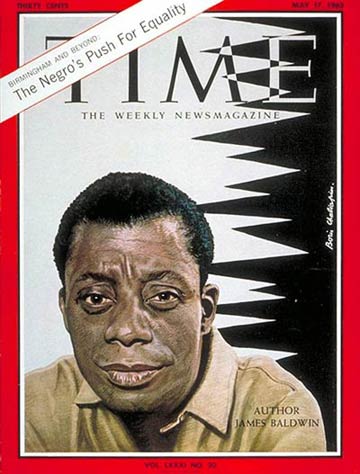
James Baldwin
(2 of 4)
"I think," writes Baldwin, "if one examines the myths which have proliferated in this country concerning the Negro, one discovers beneath these myths a kind of sleeping terror of some condition which we refuse to imagine. In a way, if the Negro were not here, we might be forced to deal within ourselves and our own personalities with all those vices, all those conundrums, and all those mysteries with which we have invested the Negro race. Uncle Tom is, for example, if he is called Uncle, a kind of saint. He is there, he endures, he will forgive us, and this is a key to that image. But if he is not Uncle, if he is merely Tom, he is a danger to everybody. He will wreak havoc on the countryside. When he is Uncle Tom, he has no sex—when he is Tom, he does—and this obviously says much more about the people who invented this myth than it does about the people who are the object of it." The Negro is thus penalized for "the guilty imagination of the white people who invest him with their hates and longings, and is the principal target of their sexual paranoia."
Fear & Acceptance. And what of the Negro's rage? It grows, says Baldwin, from the white man's "sleeping terror." "We would never, never allow Negroes to starve, to grow bitter, and to die in ghettos all over the country if we were not driven by some nameless fear that has nothing to do with Negroes. We would never victimize, as we do, children whose only crime is color, and keep them, as we put it, in their place. We wouldn't drive Negroes mad as we do by accepting them in ballparks, and on concert stages, but not in our homes, and not in our neighborhoods, and not in our churches."
Negro rage is provoked, furthermore, by the white man's insistence on his own superiority, by his demand that the Negro, to achieve equality, must be accepted according to the white man's own definition of acceptability. "I do not know many Negroes who are eager to be 'accepted' by white people," writes Baldwin, "still less to be loved by them; they, the blacks, simply don't wish to be beaten over the head by the whites every instant of our brief passage on this planet.
"White people will have quite enough to do in learning how to accept and love themselves and each other, and when they have achieved this—which will not be tomorrow, and may very well be never —the Negro problem will no longer exist, for it will no longer be needed.
"The Negro's experience of the white world cannot possibly create in him any respect for the standards by which the white world claims to live. His own condition is proof that white people do not live by these standards. Negro servants have been smuggling odds and ends out of white homes for generations, and white people have been delighted to have them do it, because it has assuaged a dim guilt and testified to the intrinsic superiority of white people ... In any case, white people, who had robbed black people of their liberty and who profited by this theft every hour that they lived, had no moral ground on which to stand."
Watermelon & Images. The Negro no longer can be controlled by white America's image of him. "This fact," says Baldwin, "has everything to
